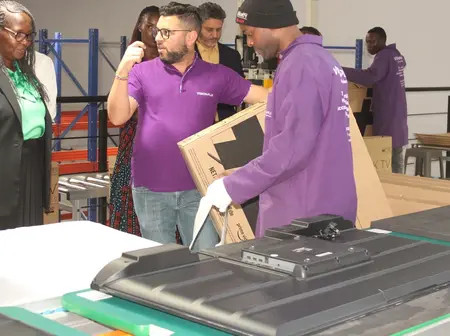Vision Plus consumer electronics and appliances has become the first-ever locally manufactured LED TVs plant in Kenya’s Special Economic Zones. The assembly plant, with a capacity to produce at least 200,000 sets annually, has been built with a firm focus on serving the burgeoning regional markets. Operated by Step Up Technologies, it is situated in the Tatu City Special Economic Zone.
Speaking during the official opening of the assembly plant on Friday, Ms. Regina Ombam, Principal Secretary in the State Department of Trade, stated that the government would support the growth and development of local entrepreneurs and investors interested in establishing local assembly plants to serve the domestic and regional markets.
“Our regional markets offer local businesses expansive markets for a broad range of products,” Ms Ombam. “We are immensely impressed by the drive shown by Vision Plus to establish a local assembling facility for TVs and consumer electronics and have learned a lot in terms of possible policy interventions to ease the investment and operational processes for such entrepreneurs.”
Echoing her sentiments, Umesh Bhojwani, Managing Director of StepUp Technologies, the operating name for the Vision Plus brand, noted that the firm was eyeing the East African Community (EAC), Common Market for East and Southern Africa (COMESA) and the African Continental Free Trade Area (AfCFTA) with the investment in the new assembly plant.
Setting up the flat panel TV manufacturing plant in Kenya allows the firm to increase its total production capacity. Furthermore, it enables the firm to achieve reduced production costs through optimised supply chain management, logistical efficiencies, and a stable and consistent supply to the target markets.
“When fully operational, we will be producing upwards of 500,000 TV units annually to serve the local and regional markets. We’ll be producing a wide range of TVs, from 24 inches to 75 inches. At the same time, we envisage immense technology transfer through the technical training of our teams in both production and recycling as we ramp up research and development targeted at reducing the impact of electronic waste in the country,” said Bhojwani.
Referring to the 2019 national census, Bhojwani noted that the data shows 12.1 million homes in Kenya, 4.9 million of which had televisions, indicating a low penetration rate for television sets in general. Meanwhile, a 2024 Statista forecast projected the market to reach 1 million units sold by 2028. He pointed out that the plant will also serve other global brands that intend to serve the regional markets but lack local production capacity.
“This venture is also a powerful engine for local value creation and skills development. Our impact goes beyond manufacturing; it extends to deep-rooted technology transfer. We will not only produce our own brands but also engage in contract assembly for others, like Sony,” added Bhojwani.
The firm expects to train hundreds of Kenyans in modern electronic television assembly, repair, and recycling, fostering a skilled workforce for the entire region.

Leave a Reply